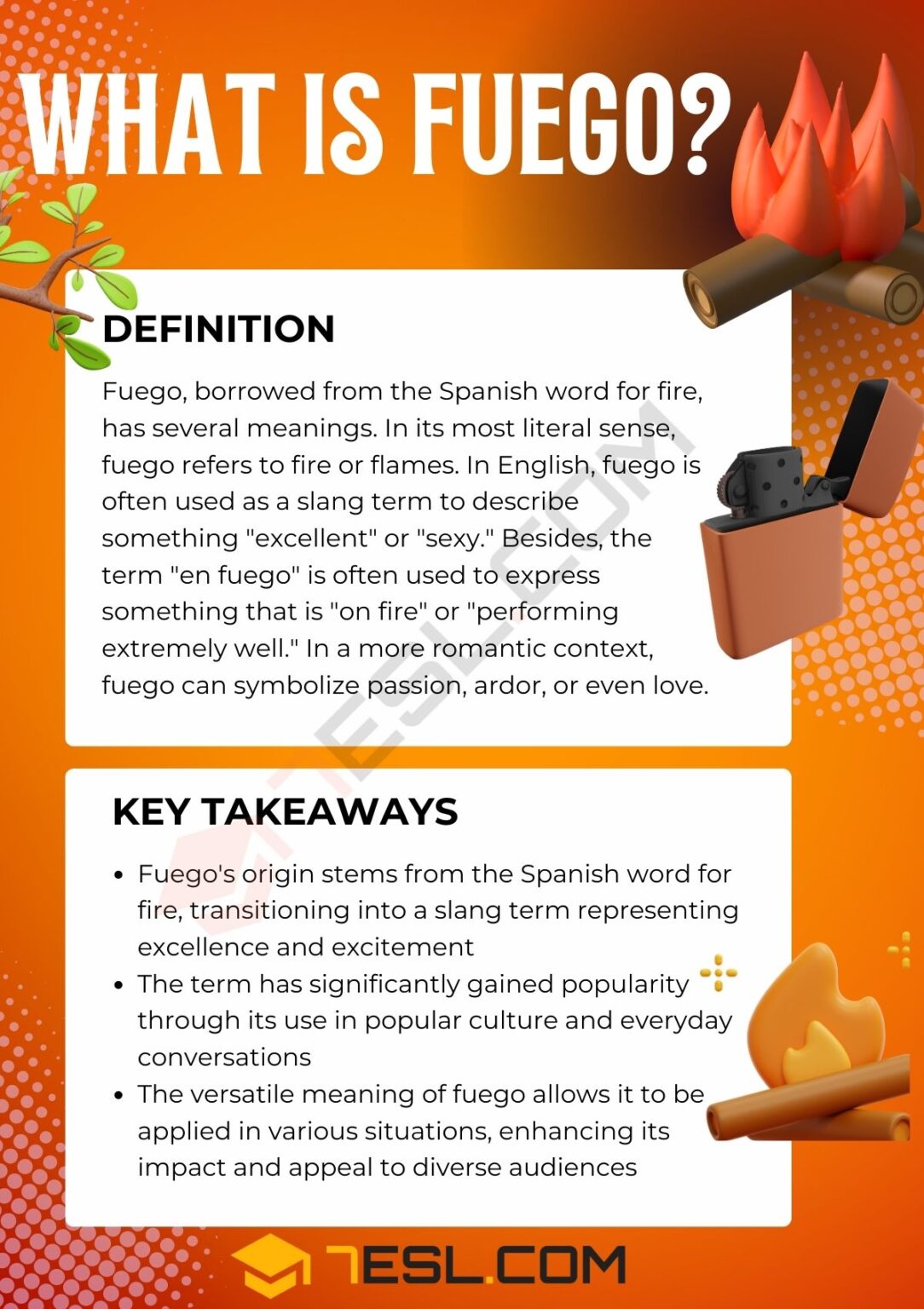Fuego meaning has captivated linguists and enthusiasts alike, transcending mere translation to embody a rich tapestry of cultural significance. This term, rooted in the Spanish language, translates to "fire," but its implications stretch far beyond the flames. In this article, we will explore the various dimensions of fuego meaning, its usage in different contexts, and why it matters in today’s discourse.
As we delve deeper into the meaning of fuego, we will uncover its applications in literature, music, and even social movements. The term resonates with passion, intensity, and sometimes destruction, making it a powerful word in multiple languages and cultures. Whether you are a language learner, a cultural enthusiast, or simply curious, understanding fuego meaning can enrich your vocabulary and cultural knowledge.
By the end of this article, you will not only grasp the literal translation of fuego but also appreciate its metaphorical and emotional weight. So let us embark on this journey to demystify fuego meaning and its place in our lives.
Table of Contents
- What is Fuego?
- Etymology of Fuego
- Fuego in Culture
- Fuego in Literature
- Fuego in Music
- Fuego in Social Movements
- Fuego in Popular Philosophy
- Conclusion
What is Fuego?
Fuego, a Spanish word meaning "fire," serves as a metaphor for various concepts. Here are some key aspects of its definition:
- Literal Meaning: Refers to combustion or flames.
- Figurative Meaning: Represents passion, enthusiasm, and intensity.
- Symbolic Meaning: Often associated with destruction and transformation.
Etymology of Fuego
The word fuego comes from the Latin "focus," which means "hearth" or "fireplace." Over time, it evolved in the Spanish language to take on its current form and meaning. Understanding the etymology of fuego provides insight into its enduring significance across cultures.
Fuego in Culture
Fuego holds a prominent place in various cultures, symbolizing warmth, comfort, and the human spirit. Here are some examples:
- In many cultures, fire rituals are used to celebrate life events.
- Fire is often a central theme in folklore and mythology, representing both creation and destruction.
Understanding these cultural nuances can deepen your appreciation of fuego meaning.
Fuego in Literature
Literature often employs fuego as a powerful symbol. Here are some notable examples:
- In Gabriel Garcia Marquez's works, fuego often symbolizes passion and desire.
- Poets use fuego to evoke strong emotions, linking it to love and loss.
Fuego in Music
Fuego has found its way into various music genres, often representing emotional highs and lows. Some popular songs featuring fuego include:
- "Fuego" by Shakira - A song that embodies passion and love.
- "Fuego" by J Balvin - A vibrant track celebrating life and energy.
Fuego in Social Movements
In recent years, fuego has also emerged as a metaphor in social movements. Activists use the term to ignite passion and motivate change. For example:
- The term represents the urgency of climate action.
- It symbolizes the passion behind social justice movements.
Fuego in Popular Philosophy
Fuego has also made its mark in popular philosophy, often used to discuss the dual nature of fire:
- Fire as a source of warmth and comfort versus fire as a destructive force.
- It prompts discussions about balance in life and the passions we pursue.
Conclusion
In summary, fuego meaning extends far beyond its literal translation of "fire." It encompasses a range of emotions, cultural significances, and philosophical inquiries. By understanding fuego, we gain insights into the human experience, from passion and creativity to destruction and transformation. We encourage you to reflect on how fuego manifests in your life and the world around you.
If you found this article enlightening, please leave a comment below, share it with others, or explore more of our content!
Final Thoughts
Thank you for taking the time to explore fuego meaning with us. We hope you found it informative and engaging. Don't hesitate to visit us again for more enriching articles on language and culture!




